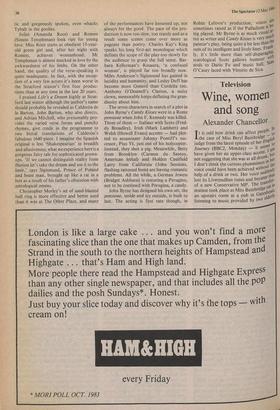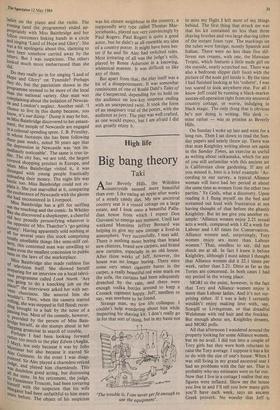Television
Wine, women and song
Alexander Chancellor
It is odd how drink can affect people' to the case of Miss Beryl Bainbridge judge from the latest episode of her Eng"' „, Journey (BBC2, Monday) — it seems t" have given her an upper-class accent. I an; not suggesting that she was at all drunk, her I don't think the curious plumminess 1 the voice could have been achieved wir"ut help of a drink or two. Her voice sudden!) lost its Liverpudlian tones and became tha.1 of a new Conservative MP. The transf°.rn 'nation took place as Miss Bainbridge sat Al an upstairs room at a pub in Gateshea", listening to music provided by two elder')
ladies on the piano and the violin. The evening (and the programme) ended ap- propriately with Miss Bainbridge and her fellow customers linking hands in a circle and singing 'Land of Hope and Glory'. She was a bit apologetic about this, claiming to have been somehow carried away by the others. But I was suspicious. The others looked much more embarrassed than she did.
Do they really go in for singing 'Land of Hope and Glory' on Tyneside? Perhaps they do, but the patriotism shown in the Programme seemed to be more of the local than the national variety. One man was complaining about the isolation of Newcas- tle and London's neglect. Another said: 'I choose to live in this dump because, you know, it's our dump.' Dump it may be but, as Miss Bainbridge discovered to her amaze- ment, the people of Newcastle are engaged in a colossal spending spree. J. B. Priestley, In whose footsteps she has been following these past weeks, noted 50 years ago that the depression in Newcastle was 'not im- mediately noticeable'. The same is true to- day. The city has, we are told, the largest Covered shopping precinct in Europe, and when Miss Bainbridge visited it, it was onged with young people frantically unloading their money. The night life was hectic too. Miss Bainbridge could not ex- Plain it. She just marvelled at it, comparing the exuberance of Newcastle with the gloom she had encountered in Liverpool. Miss Bainbridge has a gift for sniffing out the touching and the comic. In Whitley Ray she discovered a shopkeeper, a cheerful old boy proudly personifying whatever is theoPposite of Mrs Thatcher's 'go-getting society'. Having apparently sold nothing at all for several years (his stock comprising totally unsellable things like semi-stiff col- lars), this contented man was unwilling to make even the smallest concession to public taste or the laws of the marketplace. Miss Bainbridge also made ruthless fun Of television itself. She showed herself preparing ing for an interview on a local televi- sl°n programme called Look North. 'Are You going to do a knocking job on the vPlace?' the interviewer asked her with ner- vous cheeriness. She assured him she wouldn't. Then, when the camera started :"Ing she was stopped in full flood; recor- ding brought to a halt by the noise of a passing bus. Most of the comedy, however, .Provided by the person of Miss Bain- Duridge herself, as she stumps about in her apPIng greatcoat in search of trouble. r Perhaps I had been looking forward 3ather too much to the play Edwin (Anglia, May), not only because it was by John Mortimer but also because it starred Sir Alec Guinness. In the event I was disap- POinted. Sir Alec played a charmless retired J„tldge, and played him charmlessly. This 7,as doubtless good acting, but distressing as1.1 the same. In his retirement, the judge, "Fennimore Truscott, had been torturing intself with the suspicion that his wife Margaret had been unfaithful to him many years before- The object of his suspicion
was his closest neighbour in the country, a supposedly arty type called Thomas Mar- joriebanks, played not very convincingly by Paul Rogers. Paul Rogers is quite a good actor, but he didn't at all resemble my idea of a country potter. It might have been bet- ter if he and Sir Alec had switched roles. Most irritating of all was the judge's wife, played by Renee Asherson in a knowing, whimsical manner. It was difficult to like any of them.
But apart from that, the play itself was a bit of a disappointment. It was somewhat reminiscent of one of Roald Dahl's Tales of the Unexpected, depending for its hold on the audience on low-key suspense ending with an unexpected twist. It took the form of an imaginary trial of the potter, with the audience as jury. The play was well crafted, as one would expect, but I am afraid I did not greatly enjoy it.







































 Previous page
Previous page